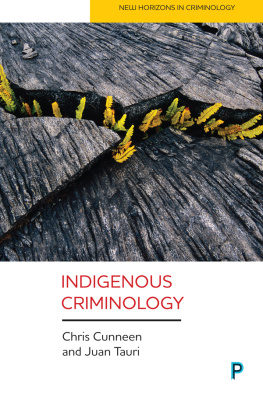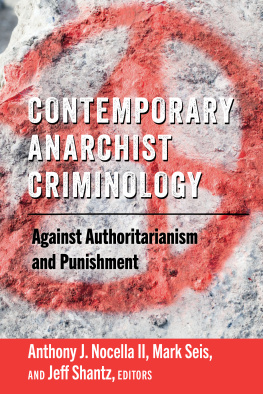NEW HORIZONS IN CRIMINOLOGY
CONVICT CRIMINOLOGY
Inside and out
Rod Earle
For my mother and father
First published in Great Britain in 2016 by
Policy Press University of Bristol 1-9 Old Park Hill Bristol BS2 8BB UK Tel +44 (0)117 954 5940 e-mail
North American office: Policy Press c/o The University of Chicago Press 1427 East 60th Street Chicago, IL 60637, USA t: +1 773 702 7700 f: +1 773-702-9756 e:
Policy Press 2016
British Library Cataloguing in Publication Data
A catalogue record for this book is available from the British Library
Library of Congress Cataloging-in-Publication Data
A catalog record for this book has been requested
ISBN 978-1-4473-2364-8 hardcover
ISBN 978-1-4473-2368-6 ePub
ISBN 978-1-4473-2369-3 Mobi
The right of Rod Earle to be identified as author of this work has been asserted by him in accordance with the Copyright, Designs and Patents Act 1988.
All rights reserved: no part of this publication may be reproduced, stored in a retrieval system, or transmitted in any form or by any means, electronic, mechanical, photocopying, recording, or otherwise without the prior permission of Policy Press.
The statements and opinions contained within this publication are solely those of the author and not of the University of Bristol or Policy Press. The University of Bristol and Policy Press disclaim responsibility for any injury to persons or property resulting from any material published in this publication.
Policy Press works to counter discrimination on grounds of gender, race, disability, age and sexuality.
Cover design by Policy Press
Front cover image: istock
Readers Guide
This book has been optimised for PDA.
Tables may have been presented to accommodate this devices limitations.
Image presentation is limited by this devices limitations.
Contents
Acknowledgments
Way back in 2000, Tim Newburn gave me an academic job when I really needed one and kept me in work until I found my feet. He, along with Mike Shiner who welcomed me at Goldsmiths College and steered me through my first research project, provided a warm and embracing introduction to the realm of research and academic practice. Tim has been an inspiration and model of intellectual generosity. His enthusiasm for ideas and research, for collaboration and rigour in method and writing, along with his tireless energy and sparkling humour are, thankfully, infectious but almost entirely harmless.
Before that, John Lea, Jock Young, Roger Matthews and Jayne Mooney, my tutors on the MA Criminology at Middlesex, found and fed a hunger for criminology I did not know I had. Jocks gentle coaxing and genial good humour was light and casual but irresistibly memorable. His premature death is a huge loss to criminology. John recently disclosed to me his own time inside a month on bail spent in Brixton prison in the mid sixties after his arrest protesting against the military seizure of power in Greece. He was an inspiring and generous teacher.
Coretta Phillips at the LSE is the reason I am able to write this book. She has encouraged and inspired me with patience, insight and thoughtful reflection. She included me in the ESRC project on Ethnicity, Identity and Social Relations in Prison in 2006 and as a result I was able to complete a PhD by Publication. Coretta warned me, at the outset, that many otherwise productive academic relationships have come apart over messy disputes on the distribution of authorship of a projects findings. Having agreed these in advance and as we proceeded to develop publications, we avoided such an outcome and continue to profit, in the best senses of the word, from a productive relationship. That Coretta waded through a complete draft of this book and made helpful and encouraging comments on each chapter, indicates how exceptionally lucky I have been to work with an academic who combines generosity and intellectual openness with systematic organisational thoroughness. Though we still disagree about pre-formatting text in Microsoft Word documents, working with Coretta has never been anything less than a pleasure.
It was through Coretta that I met Andreas Aresti and between us, and the able support of Sacha Darke, we hatched the idea of a British Convict Criminology group. With Andy and Sacha and the enthusiastic encouragement of many members of the British Society of Criminology the group has grown to include other ex-prisoner scholars, such as Bill Davies and Dave Honeywell. Bills close and supportive reading of various chapter drafts was particularly welcome. They have all been a supportive presence during the preparation of this book, and the future of Convict Criminology in Britain is in good hands with them.
Jeffrey Ian Ross and Stephen C Richards of the US Convict Criminology group have been a source of inspiration through their invention and organisation of Convict Criminology, with other ex-convict scholars in the US. Both have provided generous encouragement and guidance in completing this book.
At the Open University I am grateful to my colleagues in the Department of Health and Social Care, particularly Richard Hester, Wayne Taylor and Carol Johnson for providing a stimulating and supportive academic environment. My Head of Department, Mary Twomey has never been anything less than supportive and has helped focus my efforts and interests. OU Colleagues in Social Policy and Criminology, particularly my PhD supervisors Deb Drake and Steve Tombs show how it should be done, with integrity, originality and without compromise.
At Policy Press Victoria Pittman has steered the project to completion with a minimum of fuss and bother. I am particularly grateful to Andrew Millie, the Series Editor, for inviting me to take this project on, and prompting me to write about convict criminology.
My children, Chloe, Joe and Hannah, have kept my feet on the ground and my heart bursting with pride. Charlotte has put up with me for the best part of 30 years. Her love and support throughout the various criminological projects Ive worked on are a helpful reminder that when all is said and done, borrowing slightly from Rilke, loving each other and keeping our family well is the work for which all other work is merely preparation.
I am very lucky to have two wise older sisters and a smart younger brother who provide me with constant intellectual traffic and emotional warmth. This book is dedicated, with love, to my mother and father. With children of my own I now know more of what Ive put them through. Even though theirs was a generation given much more to hope and faith in the future than the anxious misgiving that grips my own, the distress I must have caused at various times, alluded to herein, cannot have been easy to bear. For that, I am sorry. They have expected nothing and been willing, it always seemed to me, to give everything, so this is for them.
For one human being to love another: that is perhaps the most difficult of all our tasks, the ultimate, the last test and proof, the work for which all other work is but preparation. Rainer Maria Rilke, Letters To A Young Poet
NEW HORIZONS IN CRIMINOLOGY
Series editor: Professor Andrew Millie, Department of Law and Criminology, Edge Hill University, UK
Preface
The Policy Press New Horizons in Criminology book series provides concise authoritative texts which reflect cutting edge thought and theoretical developments in criminology and have an international scope. Divided into eight chapters, these short accessible texts explain principles and developments clearly before going deeper into the subject, and are written so that the non-specialist academic, student or practitioner can understand them. Written by leading authors in their fields, the series aims to become essential reading for all academics and students (and practitioners) interested in where criminology is heading.





